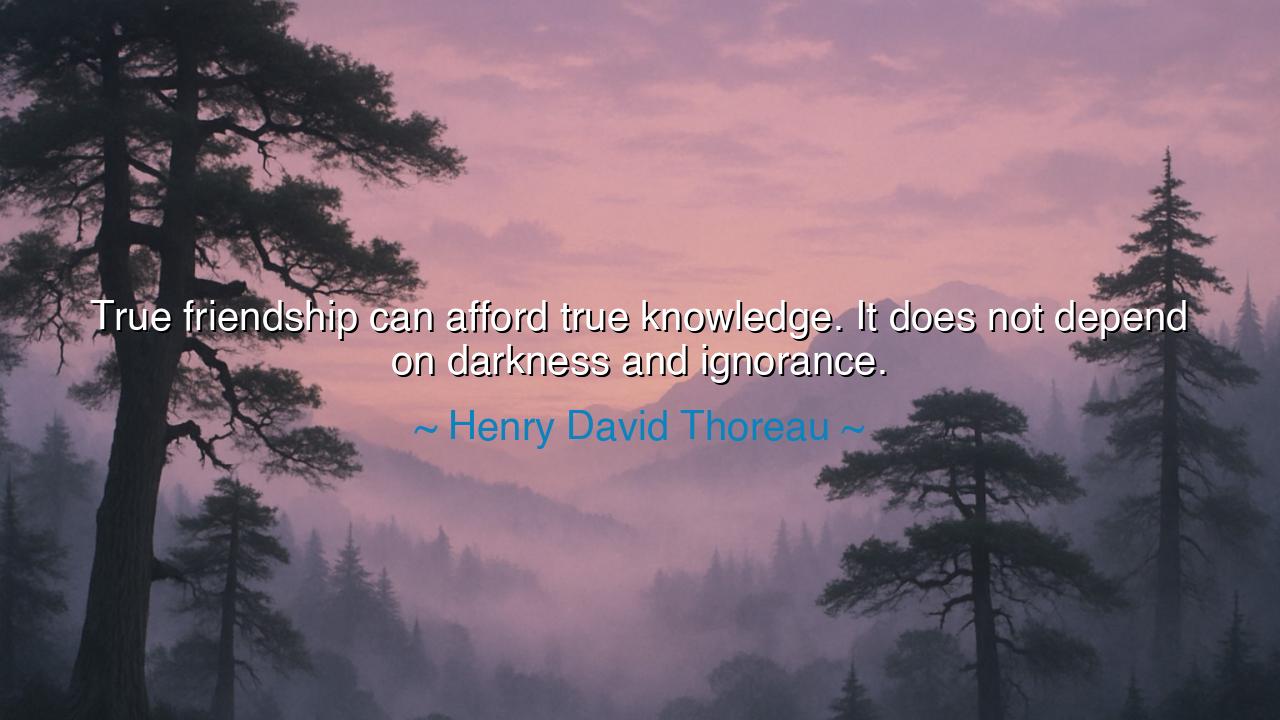
True friendship can afford true knowledge. It does not depend on
True friendship can afford true knowledge. It does not depend on darkness and ignorance.






“True friendship can afford true knowledge. It does not depend on darkness and ignorance.”
Thus wrote Henry David Thoreau, the sage of Walden Pond, whose eyes were turned both toward the quiet depths of nature and the restless spirit of man. In this short yet profound saying, Thoreau reveals the essence of authentic friendship—a bond not built upon illusion or flattery, but upon truth and understanding. He reminds us that friendship thrives not in shadows, where false comfort hides, but in the clear light of honesty and knowledge. For the love between friends is not weakened by truth; rather, it is strengthened by it, as iron is tempered by flame.
The origin of these words lies in Thoreau’s reflections on the nature of human relationships, drawn from his life of simplicity and self-examination. In his solitude by Walden Pond, he sought to strip away all that was artificial—to know life, and himself, as they truly were. In this same spirit, he believed that friendship must also be free of pretense. Many friendships, he observed, rest upon ignorance, where each person sees only what is pleasing and avoids what is difficult. But this, to Thoreau, was not love—it was avoidance. A true friend, he declared, must see clearly, speak honestly, and still love deeply. Such friendship can endure truth’s bright light, because its roots lie in respect, not illusion.
The meaning of this quote speaks to the courage that friendship demands. To know another person truly—to see both their virtues and their flaws—is a kind of sacred knowledge. It requires openness and vulnerability, the willingness to look beyond appearances into the soul. Yet, how many friendships are built upon comforting lies, upon silence where there should be speech, or flattery where there should be truth? Thoreau teaches that friendship which depends on ignorance is fragile, like a house built on sand; but friendship that stands in the full light of knowledge—where each knows the other’s strengths and weaknesses and still chooses loyalty—this is the friendship of eternity.
Consider the friendship between Ralph Waldo Emerson and Henry David Thoreau himself—a bond both luminous and tumultuous. Emerson was Thoreau’s mentor and friend, but also a man of strong opinions and lofty ideals. At times, their relationship was tested by disagreement and misunderstanding. Yet both men held truth above comfort. Thoreau’s independence sometimes wounded Emerson’s pride, and Emerson’s criticism sometimes chilled Thoreau’s spirit, but beneath these storms ran a deep current of respect. When Thoreau died, Emerson spoke of him not as a disciple, but as “a master,” for he knew that Thoreau’s honesty, though difficult, had been a form of love. Their friendship did not rest upon ignorance; it was a living dialogue between truth and affection.
Thoreau’s words also contain a hidden challenge to the human heart. Many fear truth, believing it will destroy love. Yet the opposite is true: only through truth can love be made real. To conceal one’s thoughts, to hide one’s heart, is to live in shadow. In such darkness, misunderstanding festers, and affection becomes a fragile illusion. But when two friends dare to walk in light—to speak what is true, even when it is hard—they discover a deeper connection, one that no falsehood can break. For in that moment, both are seen as they truly are: imperfect, yet worthy of love.
Let us remember also that knowledge is not merely of the mind, but of the heart. To “know” a friend is to understand their sorrows, their hopes, their fears. It is to hold their truths without judgment, as one might cradle a flame in the palms. Such knowledge cannot exist where there is ignorance, for ignorance blinds us to the humanity of others. Thoreau calls us to awaken our vision—to look clearly, speak gently, and love steadfastly. In doing so, we make friendship a mirror of truth itself.
Thus, the lesson of Thoreau’s wisdom is both gentle and demanding. Be honest, and seek honesty in your companions. Do not build friendship upon mere politeness, nor keep peace at the price of truth. Speak kindly, but do not hide what must be said. Welcome the light into your relationships, even when it exposes imperfection, for light reveals beauty as well as flaw. In this way, your friendships will grow not in darkness, but in the radiant field of understanding, where trust and love bloom side by side.
And so, Thoreau’s words live on as a timeless beacon: “True friendship can afford true knowledge. It does not depend on darkness and ignorance.” For the highest friendships, like the purest hearts, do not shrink from the truth—they embrace it. They stand in the open air of honesty, rooted in respect, shining with compassion. To walk such a path is to know the rarest joy of all: the peace of being seen, known, and loved completely—for who you truly are.






AAdministratorAdministrator
Welcome, honored guests. Please leave a comment, we will respond soon